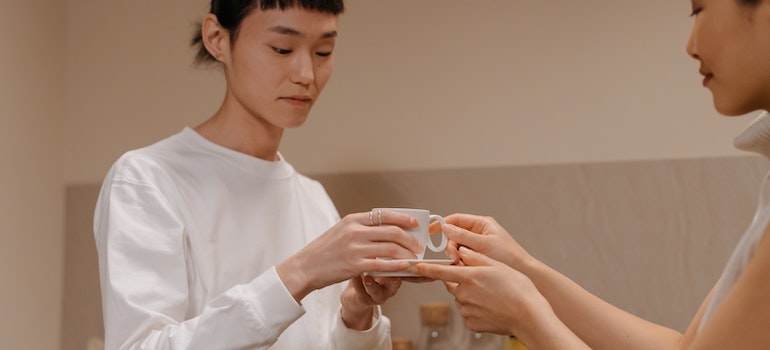Harmonious life as a teenager and with one can be particularly challenging in this day and age. The swirling hurricanes of hormones are difficult to be at peace. However, it’s important to maintain and strengthen a relationship with your little hurricane because these are the years they are especially sensitive to the world around them and can easily get into trouble. Our experts at drug and alcohol rehab in West Virginia are here to suggest how to connect with your teenager to prevent drug use and all its consequences.
Show them you’re on the same team
The biggest stepping stone in every ”parent-teenager” relationship is the generational gap. Teenagers feel that their parents can’t possibly understand what they’re going through since they’re living in different historical eras. This feeling is also fueled by the image and the role of the parents in the general present – a rebellious teenager can’t imagine that their parents were just like them once, with the same emotions, with the same problems.
It’s important for you to remember that you’ve walked in their shoes, but they have yet to walk in yours. Don’t blame their feelings on them. Instead, put an effort to let them know that you are not at all that different, just on a different level of experience.

Share your stories
To connect with your teenager to prevent drug use, tell them about some of your experiences in order to paint a picture that you do, in fact, understand what they are going through. Maybe you’ve tried some drugs in the past; maybe you were addicted – talk about it. It’s hypocritical to hide those things and expect honesty from the other party. Experts from the rehab center in Clarksburg WV say that being open about your encounters helps a lot in building a connection to prevent addiction.
The more you share, the more solid arguments you’ll have on the subject you want to educate your kids on. Just make sure not to invalidate or undermine their struggles in the process.
Empathy over strictness
Communicate your empathy to your youngster. Adolescence is a challenging time. Admit that you, too, have had difficulty but that indulging in harmful substances is not the answer. Give your kid reassurance that they can rely on you. It’s crucial to reassure your kid that you care about their well-being and want to see them succeed in life.
Treat your teenagers like adults
A word of advice – treat your children how you would want to be treated. Don’t speak down on them, and don’t put yourself in a position of power. Keep in mind that teenagers are very vulnerable to condescension and that they will ultimately be the ones who make the choices. If you want children to grow up to be responsible adults, act like it. As our experts from rehab near Athens OH say, by treating them like adults, you’re sending a message that you want them to behave properly, not only for your benefit but for their own.
Prepare your arguments, and don’t be shy about explaining them
Explain in detail why you’re cracking down on drug abuse. It’s very uncommon for teenagers to be told to do something without being provided a clear explanation of why they should. The risks associated with drug and alcohol use are quite real. Teens shouldn’t be experimenting with anything since it’s harmful and against the law.

Paint a picture with examples
Act in a reasonable and forthright manner. Some illicit drugs are obviously more harmful than others. Heroin is far riskier than cannabis. Yet, even in small doses, certain substances may be fatal. For example, although a single beer might make you feel tipsy, ten of them could be fatal. As our experts from rehab near Cambridge OH suggest, it’s important to present them with real-life scenarios and exact examples, so they won’t have much room to put this conversation under the rug.
Talk about all the risks of drug addiction
Moreover, since the use of any substance affects judgment, young people who experiment with drugs or alcohol are more likely to get themselves into troublesome and perhaps deadly situations. Patients from our rehab center for young adults report getting involved in risky situations, such as drunk driving or sexual encounters with strangers. Likewise, it may have an impact on their performance in class. They risk having a criminal record, which will hurt them when applying to universities, and being kicked off a sports team if they are detected.
Make sure to include things they truly care about. It will decrease the risk of them being involved in activities that will hurt their chances of getting something they really want.

Be an active participant in your teenager’s life
The parent-teen relationship will certainly benefit from the parent’s continued involvement and monitoring of the teen’s offline and online activities. Of course, you need to let them know that you’re taking measures to know where they are and with who. If you don’t, you might become an unwelcome guest in their private universe. As our experts from rehab near Marietta OH explain, the point is not to pry or invade their privacy but to show genuine curiosity and concern for their well-being.
Set the boundaries but let them bloom
When it comes to parenting adolescents, parents are frequently trapped. Maintaining limits while also encouraging your child’s developing sense of autonomy may be challenging. Reaching that sweet spot calls for open lines of communication, a willingness to make modifications on the fly, and a keen awareness of what’s happening in their lives at any given moment.
Here are several methods to get involved in your teenager’s life ‘just enough’:
- Try to spend as much time as possible together in person. Organize meals, walks, car rides, or just lounge around the house without the distraction of technological gadgets.
- Encourage them to tell you about their day in detail.
- Ask specific questions, like ”Was it interesting today at drama club? What did you do?” – this will show them you care, and you’ll gain valuable insight
- If they have friends over, give them privacy, but always stop to say hello and chat for a couple of seconds
- Contact the parents of their pals. You should introduce yourself the next time you get a chance to meet them if you don’t already know them. Send them a message, or give them a call to say hi.
- Inquire about your kid’s academic and extracurricular progress from teachers, coaches, and other trusted people.
- Volunteer or participate in other extracurricular activities at your child’s school.
- Maintain a periodic routine of scanning any and all applications installed on your device, as well as checking in on your social media accounts.
Try not to overdo any of these methods since that could easily build resistance in your teenager towards you and your efforts. Many parents of our teen patients at rehab near Huntington WV say that overdoing these things led to a great emotional distance between them and their children.

Avoid having ”tunel vision”
Even if some things seem ridiculous to you, they might be important to your teenager. As a parent, you can also learn a thing or two about life from your rebellious cub. So, be receptive. Try having an open mind, being interested, and being calm if you want to have a fruitful talk with your kid. Your youngster will be more responsive to your advice if you do this.
Listen with an open mind
Solicit free-form answers by asking questions. You’ll require more than a simple “yes” or “no” from your kid if you want to have a meaningful discussion with them. Listen intently. Show your adolescent that you pay attention by repeating what they say, either word for word or in terms of the general idea. As long as you don’t interrupt (under any circumstances), you’ll be able to corroborate what was said by summarizing it for the other person.
”I” is a very important word
Keep the dialogue moving by using “I” phrases. Using “I” phrases to communicate allows you to avoid making your adolescent feel judged, blamed, or connected. You provide your impressions of and reactions to the offending conduct. Afterward, you’ll need to specify and tell exactly how you feel, as well as voice how you wish those things to be handled. You know, something along the lines of, “When you don’t arrive home on time, I fear that something horrible has occurred. To reassure me that everything is well, please give me a call as soon as you realize you’ll be late.”
Also, a good example of this method: “When you’re this enraged, it’s like you can’t hear a thing I’m saying. That’s when I start to get annoyed. I’d want to discuss this with you at a later time when we’re both more attentive. You know I love you and care about you too much to risk you attending the concert. I have to have faith in you that you will not break our rules against drugs and alcohol.”
Give your teenager a say in their future
If you want to modify their conduct, use “I” phrases to appeal to their sense of self-interest rather than try to command or shame them into submission. The next step in connecting is that you give them a say in what occurs next. This is, according to the younger patients at stimulants rehab in WV, the best way to approach them in these fragile years.

Cutting your teen some slack from time to time can strengthen your bond
The protection of children is your first priority. Sometimes, that means making some internal compromises and cutting them a bit of slack. Establishing an honest and open dialogue with your children about drug use will inspire them to do the same. As our professionals from the residential treatment center West Virginia suggest, having an “amnesty policy” may be a good method to provide your adolescent with a safe environment.
Your kid may safely reach out for assistance during an amnesty period without fear of the usual consequences they would face. Amnesty policies protect youth and inspire them to make good decisions without absolving them of responsibility.
Amnesty for trust – crucial if you want to connect with your teenager to prevent drug use
For example, let your teenage daughter know that if she becomes intoxicated at a party (a very likely scenario in every teen’s life) and she has to leave, she may phone you and ask for a ride home or money for a taxi instead of risking her safety. So, without shouting or grounding, she could return home and go to bed.
Of course, you two should chat about her intoxication and how to keep herself safe in the morning. But the important thing is that she’ll have enough confidence to ask for your help when she’s vulnerable. So, you may have loosened the string a bit at one end, but at the other, you’ve gained enough trust that will help you prevent way worse things.

Take the right steps and connect with your teenager to prevent drug use
There are many programs that take care of teenagers in rehabilitation, and many more that try to prevent that scenario. Although there is a lot of good effort and those programs help a lot, nothing can compare to a connection full of trust with a parent. So make sure to connect with your teenager to prevent drug use and live in harmony with your little rebellious hurricane.
References:
https://www.mayoclinic.org/healthy-lifestyle/tween-and-teen-health/in-depth/teen-drug-abuse/art-20045921
https://youth.gov/youth-topics/substance-abuse/evidence-based-programs-youth-substance-abuse-prevention-and-treatment
https://www.ncbi.nlm.nih.gov/pmc/articles/PMC2916744/



